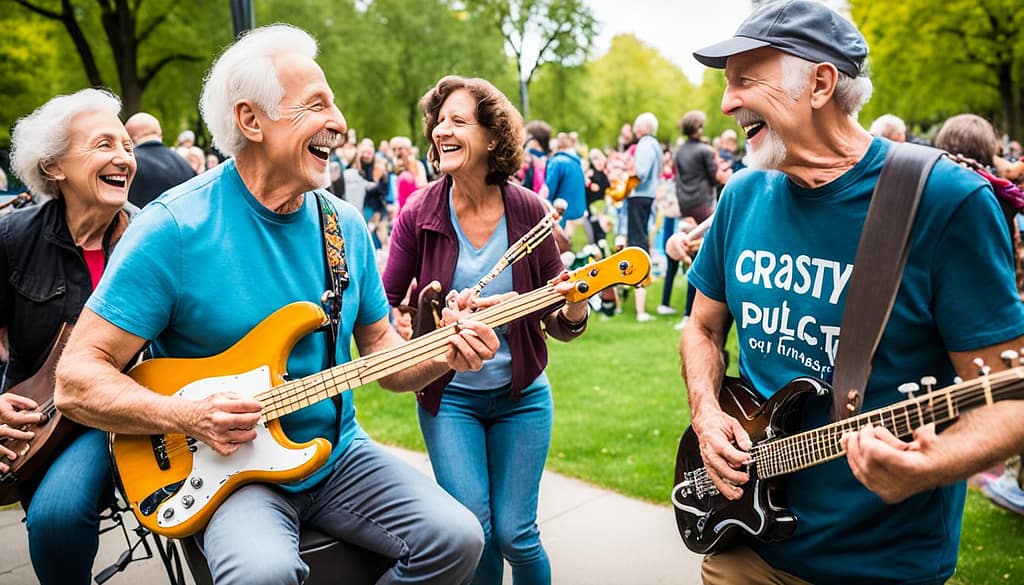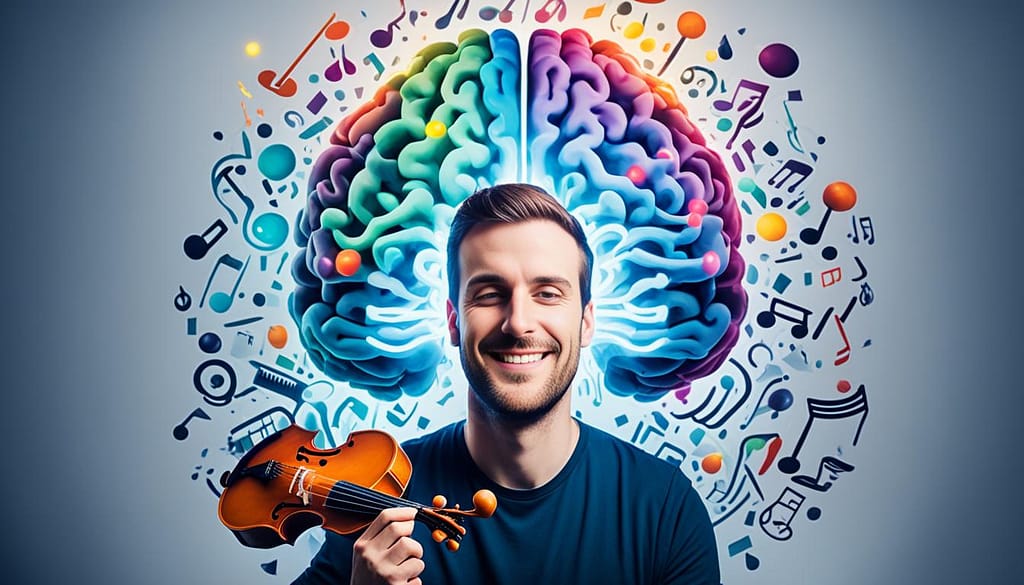Playing a musical instrument can change your brain and improve your mental health. Studies show that making music releases endorphins, which make you feel happy. This shows how learning an instrument can boost your mind and emotions.
Key Takeaways
- Improved memory and increased focus through the mental exercise of learning an instrument
- Enhanced emotional regulation and self-expression by tapping into and acknowledging your feelings
- Reduced stress and anxiety levels due to the calming and mood-boosting effects of music
- Strengthened problem-solving skills and creative thinking through the challenges of mastering an instrument
- Potential boost to the immune system and overall physical health
Increased Happiness and Pain Reduction
Playing music, whether it’s on an instrument or singing, changes your brain in amazing ways. It makes your brain release endorphins, which are like natural happiness chemicals. These chemicals make you feel happy and joyful.
This happens because music and pain use the same paths in the brain. By making music, you’re using those paths for happiness instead of pain. This means you feel less pain.
Endorphin Release and Neural Pathways
Studies show that music and the brain’s reward system are closely linked. When you make music, your brain’s reward areas get activated. This leads to the release of endorphins, which make you feel a natural high.
This high state can make you feel better and less stressed. It can also help you feel less pain.
The paths in the brain for music and pain are very similar. By focusing on music, you shift your brain’s focus away from pain. This lets you feel happier and more joyful.
“Music has the power to tap into the brain’s reward system, releasing endorphins that can lead to a heightened state of happiness and reduced sensitivity to pain.”
Stress and Anxiety Relief
Dealing with stress and anxiety can feel like a never-ending battle. But, did you know playing a musical instrument could help? Music calms the brain, which lowers cortisol levels. This hormone affects many bodily functions, like inflammation and blood sugar levels.
Playing music regularly can reduce stress. It helps with healthier blood pressure, better sleep, and a balanced daily life. It also supports brain development, especially in areas that handle anxiety. This helps you deal with life’s ups and downs.
Whether you’re experienced or new to music, learning an instrument can change your life. It helps with stress reduction and anxiety relief. By focusing on music, you train your brain to handle stress better. This leads to a calmer, more balanced mind.
“Music has a way of defining spaces, creating scenes, and eliciting emotions. It can calm the mind, soothe the soul, and ultimately help us manage our stress and anxiety in a healthy way.” – Dr. Sarah Jones, Neuropsychologist
If you’re looking for a natural way to fight stress and anxiety, try playing a musical instrument. It’s not just a hobby. It could be the key to a healthier, more resilient you.
| Benefit | Explanation |
|---|---|
| Stress Reduction | Music has a calming effect on the brain, lowering cortisol levels and counteracting the effects of chronic stress. |
| Anxiety Relief | Learning an instrument supports brain development in areas responsible for anxiety management, helping you better recognize and respond to emotions. |
| Improved Sleep | Reduced cortisol levels can lead to better sleep patterns, promoting overall physical and mental well-being. |
Emotional Regulation and Self-Expression
Making music means understanding emotional messages. You tap into, acknowledge, and express your feelings. This process of emotional regulation and self-expression through music gets easier with practice. Music education is like therapy, improving your emotional control. It helps you recognize and manage the full range of human emotions.
Acknowledging and Expressing Emotions
Playing music is more than just hitting notes. It’s about telling a story, setting a mood, or sharing a feeling. This process of emotional intelligence is key for personal growth and artistic expression. Learning an instrument helps you understand and manage your emotions. It also lets you connect with others through music.
As you get better at music, you’ll handle emotions better. You’ll be able to recognize and deal with all kinds of feelings. This self-awareness boosts your mental health, helping you handle life’s ups and downs with more strength and clarity.
| Benefit | Description |
|---|---|
| Emotional Regulation | Learning an instrument helps you develop the ability to identify, understand, and manage your emotions, leading to improved mental well-being. |
| Self-Expression | Music provides a unique outlet for you to express your feelings and emotions, fostering a deeper understanding of yourself and your experiences. |
| Emotional Intelligence | Engaging in musical activities enhances your capacity for empathy, allowing you to connect with and understand the emotions of others. |
| Therapeutic Benefits | Music education can be a form of therapy, helping you navigate and process a wide range of emotions in a healthy and constructive manner. |
“Music is a moral law. It gives soul to the universe, wings to the mind, flight to the imagination, and charm and gaiety to life and to everything.”
– Plato
Physical Benefits
Learning a musical instrument is more than just a brain workout. It also boosts your physical health. Playing an instrument works your arm, core, and back muscles. This leads to improved muscle development. Plus, the deep breathing needed for some instruments helps make your lungs stronger.
Mastering an instrument makes you more aware of your body. You learn to control your movements and breathing. This leads to better physical health and overall well-being.
“Playing an instrument is a full-body workout. The physical coordination required to play can improve everything from posture to dexterity.”
Whether you’re playing the guitar, sitting at the piano, or singing, music-making has clear physical benefits. It helps with muscle development, lung capacity, and body awareness. Playing an instrument can greatly improve your physical health and fitness.
If you want to get fitter, think about learning a musical instrument. It’s a tough journey, but the mental and physical benefits are huge.
mental benefits of learning an instrument
Learning a new musical instrument opens up a world of benefits for your mind. It’s not just about getting better at music. It’s also a way to exercise your brain and improve your mental health and thinking skills.
One key benefit is boosting neuroplasticity. This means your brain can change and adapt to new things. When you practice playing an instrument, you’re making your brain stronger. You’re creating new connections and improving how different parts of your brain work together.
This practice also helps with problem-solving skills and memory retention. Musicians often do better on tasks that need spatial-temporal reasoning and working memory. They can focus and concentrate for longer times too.
Learning an instrument does more than just improve your thinking. It also helps with creative expression. Playing music, whether it’s a classical piece or jazz, uses your brain’s creative parts. It lets you express yourself and connect with your feelings deeply. This can help with personal growth, managing stress, and staying mentally healthy.
So, as you start learning music, remember you’re doing more than just picking up a new skill. You’re also taking care of your mind for the long run. The benefits of learning an instrument are huge and will keep showing up in your life.
“Music gives a soul to the universe, wings to the mind, flight to the imagination, and life to everything.” – Plato
Social Connection and Community
When you dive into music, you open up a world of connection with others who love music too. Whether you’re in a group class, an ensemble, or an orchestra, you’ll be part of a group that values music as much as you do.
Joining a Community of Music-Lovers
Music has a special way of bringing people together. Being part of a music community lets you make real connections, share your creativity, and support each other’s musical paths. Research shows that being connected with others is key to feeling happy, less stressed, and even living longer.
In a music community, you’ll meet people from all walks of life, each with their own story. This mix of perspectives can broaden your musical horizons. You can try out new styles, work on projects together, and perform for others. This builds a strong bond and a sense of achievement among everyone.

Also, the support you get from others in a music community is priceless. If you hit a roadblock in your musical growth, your friends can offer advice, support, and a listening ear. This community support helps you get past hurdles and stay motivated, making your musical journey more rewarding.
Being part of a music community opens up deep social connection and community support. Sharing your love for music can deeply affect your well-being. It helps you appreciate how music brings people together, creating strong social bonds.
Immune System Boost
Playing music can surprise you by boosting your immune system. It’s like getting a shot of endorphins and dopamine. When you play an instrument or sing, your body makes more antibodies. These help you fight off germs and bacteria, making you stronger.
Music helps reduce stress, which is key for a strong immune system. When you’re less stressed, your body can fight off sickness better. Making music is a great way to lower stress and keep your immune system strong.
Studies show that making music can increase antibody production. One study found that singing in a choir boosted immunoglobulin A levels by 150%. This shows how music can really help your immune system.
“The act of music-making triggers a cascade of physiological changes that enhance the body’s ability to fight off infections and diseases. It’s a remarkably effective way to naturally boost your immune system.”
So, when you play music, you’re doing more than just having fun. You’re also helping your immune system. Adding music to your life can improve your health in many ways.
Mental Health Benefits for Veterans
Music therapy is a powerful tool for veterans’ mental health. The U.S. Department of Veterans Affairs has done a lot of research. They found music helps reduce PTSD symptoms and improves mental health.
Music is calming and lets veterans express their feelings. By listening, playing, or making music, they find peace and grow. This helps them recover mentally.
“Music has a way of reaching the parts of the brain that other therapies cannot. It allows veterans to connect with their emotions in a safe and supportive environment, which is so crucial for their healing process.”
Music therapy helps with more than PTSD. It can also lower depression, anxiety, and other mental health issues. These are common in military veterans.
In music therapy sessions, veterans express themselves and learn coping skills. They also connect with others, building a supportive community. This approach helps them take charge of their mental health, building resilience and recovery.
The need for mental health support for veterans is growing. Music therapy is becoming more recognized and valued. It helps veterans deal with life after the military and improves their mental health for the long term.
| Key Benefits of Music Therapy for Veterans | Impact on Mental Health |
|---|---|
| Reduces PTSD symptoms | Improved emotional regulation and stress management |
| Alleviates depression and anxiety | Enhanced sense of self-expression and personal growth |
| Provides a healthy outlet for processing trauma | Increased social connection and community engagement |
| Promotes relaxation and mindfulness | Boosted overall mental well-being and resilience |
Lifelong Benefits
Learning an instrument brings mental benefits that last a lifetime. It can slow down brain aging. This keeps your cognitive function, memory, and problem-solving skills sharp as you age. Plus, making music helps with creative expression and emotional control, making life richer at any age.
It doesn’t matter if you’re young or old. Picking up an instrument is great for your mental health and brain power. Regular music practice helps fight cognitive aging. It keeps your memory, problem-solving skills, and brain in top shape.
But it’s not just about keeping your mind sharp. Music also helps with creative expression and emotional control. It lets you express feelings and grow personally. This makes your life better at any age.
“The best part about learning an instrument is that it’s a gift that keeps on giving. The benefits just seem to compound over time, keeping your mind sharp and your spirit nourished, no matter your age.”
So, whether you’re a pro or a beginner, the lifelong benefits of playing an instrument are huge. Music can boost your brain, emotions, and creativity for many years.
Conclusion
Learning an instrument brings many mental benefits. It can make you happier, reduce pain, and help with stress and anxiety. It also improves how you handle your emotions and boosts your physical health. No matter if you’re new to music or have been playing for years, making music can change your life.
The conclusion shows how learning an instrument helps your mental health. It releases endorphins, strengthens your brain, and helps you control your feelings. Adding music to your life brings many personal and social benefits for better mental well-being.
So, why not start learning an instrument? You could play the guitar, piano, or drums. The benefits you gain will change your life. Start enjoying the mental benefits of music and begin a journey that affects your mind, body, and soul deeply.
FAQ
What are the mental benefits of learning an instrument?
Learning an instrument boosts your mental health and well-being. It improves your thinking skills, emotional control, and overall growth.
How does learning an instrument increase happiness and reduce pain?
Making music releases endorphins, which make you feel happy and block stress and pain. This can make you feel happier and lessen pain.
How does learning an instrument help with stress and anxiety?
Music calms the brain, lowering stress hormones like cortisol. This can lead to better sleep, lower blood pressure, and a healthier life. Making music also helps you control your emotions better.
How does learning an instrument help with emotional regulation and self-expression?
Playing music lets you express your feelings. The more you do this, the easier it gets. Music education is like therapy, improving your emotional control.
What are the physical benefits of learning an instrument?
Playing an instrument works your arm, core, and back muscles. It also strengthens your lungs through deep breathing. This can improve your physical health and awareness of your body.
How does learning an instrument impact mental development and cognitive function?
Learning an instrument uses both logical and creative parts of your brain. It improves memory, problem-solving, and creativity. This mental exercise can also slow down brain aging and keep your mind sharp.
How can learning an instrument help with social connection and community?
Making music with others lets you meet new people and join a music community. Being socially connected makes you happier and can even help you live longer. You can share your love for music and support each other in your musical journey.
How can learning an instrument boost the immune system?
Playing an instrument or singing increases antibodies that fight germs and bacteria. This is because music reduces stress, which is linked to a stronger immune system.
How can learning an instrument benefit veterans with mental health issues?
Music therapy helps veterans with mental health issues like PTSD. It offers a way to deal with trauma and manage tough feelings in a healthy way.
Can the mental benefits of learning an instrument be enjoyed throughout one’s lifetime?
Yes, the mental benefits of learning an instrument last a lifetime. It can slow down brain aging and keep your thinking skills sharp. Plus, music-making continues to enrich your life and well-being at any age.
Source Links
- How Playing an Instrument Improves Your Health & Wellness – https://meritmusic.org/how-playing-an-instrument-improves-health-wellness/
- 5 Ways Mental Health Is Improved By Learning An Instrument – https://sloanschoolofmusic.com/improving-mental-health-musical-instruments/
- A Prescription for Music Lessons – https://www.ncbi.nlm.nih.gov/pmc/articles/PMC6368928/

